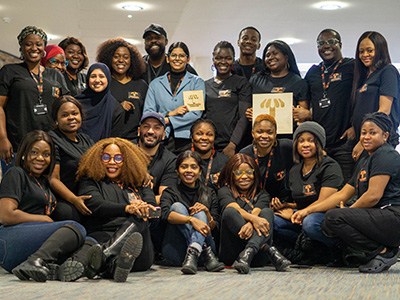Course overview
Venuka Wickramaarachchi, MA Design (with Advanced Practice)
Hear from Venuka as he talks about his experience showcasing his designs at the Ferrari fashion show in Milan.
Join our MA Design programme and equip yourself with the professional skills to become a confident design leader.
Design transforms our world by solving problems, enhancing experiences, embedding sustainability, and realising opportunities. By blending possibility and future thinking with research, you can make a difference through impactful design vision, collaboration, and knowledge integration.
Our industry-leading facilities support you to build an engaging and tailored portfolio, to showcase your ability to iterate, innovate, and develop effective solutions to real world challenges. This interdisciplinary studio environment prepares you for collaborative work in industry.
You apply a range of advanced methodologies to equip you with transferable frameworks. You shape your personal narrative through perspective and reflection while building a responsible, ethical, and theoretical framework, to develop your career networks and effect change. You work alongside peers from a variety of backgrounds to expand your critical thinking, problem solving, decision making and communication.
You enhance your career with advanced expertise, conceptual understanding, and informed decision making. You gain transferable skills, knowledge, and communication abilities that are highly valued across various industries and roles.
Top reasons to study this course at Teesside University:
- Get creative: our course and campus are powered by Adobe and Apple. We’re Europe’s first Adobe Creative Campus and the only Apple-accredited University, equipping you with the digital tools and resources to hone your creative skills.
- Collaborative modules: our MA courses include interdisciplinary modules where you can interact with people from other MA subject areas, widening your perspectives and network. Modules are also delivered in a condensed way to help you balance your other commitments.
- Industry engagement and exposure: gain direct exposure to the industry by connecting with professionals, practitioners, and thought leaders. Learn contemporary design practices and expand your professional network.
- Industry-standard facilities: develop your own design style using the latest technology, including iMacs, software and Wacom digital drawing tablets.
- Professional memberships: we’re a member of Creative UK, perfect to expand your professional network.
Creative UK Take advantage of our Creative UK membership and help futureproof your career, with networking events, a resource hub to support professional development, and bespoke workshops in partnership with industry leaders and mentors. Sign up for free student membership to get opportunities, events and newsletters sent directly to your inbox.
Take advantage of our Creative UK membership and help futureproof your career, with networking events, a resource hub to support professional development, and bespoke workshops in partnership with industry leaders and mentors. Sign up for free student membership to get opportunities, events and newsletters sent directly to your inbox.
Course details
Course structure
Core modules
Design Approaches: Innovative and Emerging Themes
Explore transformative themes and develop a distinct design narrative to thrive in evolving contexts. You engage in projects on emerging themes, unlocking new opportunities with innovative applications and enhancing your skills through participation in interdisciplinary events like exhibitions, workshops, and design jams.
Design Approaches: Making, Methods and Impact
Engage in experimental and thematic projects to develop advanced design methods and individual approaches. Refine your practice through continuous reflection, placing your work within contemporary contexts. Enhance your portfolio and deepen your knowledge by working on live briefs, external competitions and open calls to enhance your portfolio and deepen your knowledge.
Build your confidence in integrating diverse approaches and evaluating abilities within entrepreneurial, value-oriented design activities. Focus on empathetic methods and authentic teamwork through a group-defined project. Work through key design stages to build collaborative dynamics and specify opportunities that engage diverse perspectives. Pitch your ideas to an expert panel, presenting pathways to realisation for products, services, or systems with prototypes and visualisations.
Unleash your vision as you dive into a major, in-depth, individual study tailored to your discipline and career aspirations. Whether you're interested in commercial, industrial, creative, or research fields, this project is your canvas.
Take full ownership of your project, from idea to execution. Create artefacts, exhibitions, publications, campaigns, and digital works either from scratch or significantly developing your own previous work.
Integrate all your learning into a substantial body of work that showcases your vision as a creative practitioner. This is your chance to shine your brightest.
Research Through Future Practice
Explore the intricate social, political, environmental and technological interconnections through hands-on design making. Leverage historical, theoretical, and speculative perspectives to enrich your work and captivate audiences. Through project-based methods, you combine personal reflection, theory and practice to achieve transformational change. Integrate research methods, critical thinking, contextual awareness and interdisciplinary investigation in a dynamic studio environment.
Modules offered may vary.
How you learn
This programme enables you to build progressively on your knowledge and experience. At MA level it is vital that you take an active role in structuring your own learning, and engage with the relevant methods and underpinning theories of your discipline.
Teaching and learning is a student-centred, activity-based process which integrates the content, sequence and development of student learning. You develop your knowledge, skills and practice with the support of appropriate teaching and learning strategies. The methods we use, and the philosophy behind them, are under constant review and appraisal to ensure they remain relevant, rigorous and progressive.
We use a variety of methods including tutorials, seminars and workshops – this enables key learning principles to be applied to your day-to-day interactions. Individual support, provided by a personal tutor, is an integral feature of the learning and teaching strategy. An intrinsic aspect of your main study area and its supporting subjects is research.
Approaches to teaching and learning tend to have the following underlying principles.
- You develop professional responsibility and autonomy in learning to integrate theory and practice.
- We enable active and co-operative learning.
- We provide flexible and negotiated assessment opportunities directly related to the individual learning context
- Our resources match programme outcomes and needs.
- Practical workshops introduce specific skills, followed by independent learning, project work, tutorials and critiques.
How you are assessed
We use a variety of assessment methods throughout the modules, as specified in the module handbooks. These are primarily in-course assessments, where you submit work during the module rather than sit timed exams at the end.
The modules are generally project based and primarily assessed through appraising a portfolio of work, often accompanied by a verbal presentation. Design work is largely developmental – you are assessed on the process you use to achieve your solutions as well as the result, so it is essential that you provide clear evidence of your development work.
Entry requirements
Applicants are normally expected to have at least a 2.2 UK honours degree, or equivalent qualification. A range of degree subjects are acceptable including subjects related to arts, design or other creative discipline. We also consider relevant experience or equivalent qualifications.
You are expected to be a confident and independent learner with a good understanding of the design process, idea development and critical thinking. You are asked to present a portfolio of work or a completed project showing the development of your work from behind the scenes, or an ongoing project showing the progression and direction of your work.
Students with a degree awarded outside the UK must also meet the University's minimum English language requirements.
Non-EU international students who need a student visa to study in the UK should check our web pages on UKVI-compliant English language requirements. The University also provides pre-sessional English language courses if you do not meet the minimum English language requirement.
For general information please see our overview of entry requirements
International applicants can find out what qualifications they need by visiting Your Country
Employability
Career opportunities
As a graduate you have the opportunity to go on to a range of design-related employment requiring specialist digital knowledge and skills.
Information for international applicants
Qualifications
International applicants - find out what qualifications you need by selecting your country below.
Select your country:
Useful information
Visit our international pages for useful information for non-UK students and applicants.










 MA Design
MA Design MA Design
MA Design MA Design
MA Design